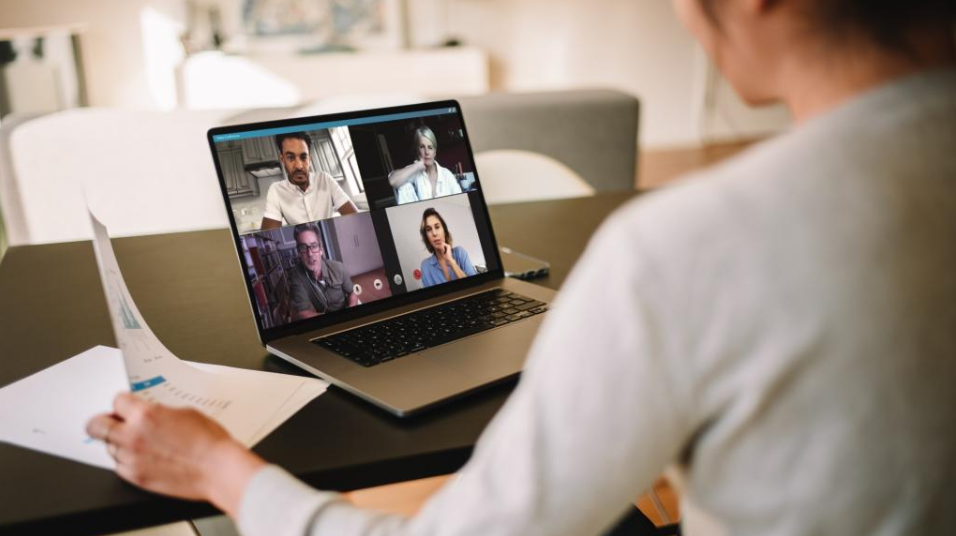At the start of the Covid-19 pandemic when everyone was in lockdown, the need of companies to join the public debate and ensure their brands remain relevant meant webinars became the new communication method. At the same time, companies could no longer travel to meet clients and hold business meetings in person so they have had to rely on video conferencing, whether via Zoom, Skype, Google Meet, Microsoft Teams or Slack.
But could it now be too much of a good thing and are we beginning to tire of the online experience?
When we meet people in face to face meetings, there are a number of non-verbal cues that we all instinctively take in while listening. These cues include whether someone is facing you or slightly turned away, if they're fidgeting while you talk, or if they inhale quickly in preparation to interrupt.
During online discussions, generally you only see someone from the shoulders up so lose the chance to see hand gestures or other body language. If the connection is poor there may be a time lapse between sound and vision and you lose those small facial expressions that mean so much.
Taking part in video conferencing impairs all these natural abilities to read body language and means our brains have to work even harder to maintain a sustained attention to the words being spoken. For some people, the brain can be overwhelmed by these excess stimuli while trying to search for non-verbal cues that don't exist.
Hence if you spend a day with back to back meetings online, your brain will be exhausted in a way it wasn't with in person meetings. This could explain why audiences of webinars are beginning to wane as the novelty wears off and we start to crave the ability to see someone speak live.
It is also having an impact on our mental health and some companies are introducing new rules restricting the use of these platforms and ensuring that employees take down time away from their computer screens.
One example is Heritage Bank, Australia's largest mutual bank, where Zoom meetings have been slashed after the recent explosion of online gatherings following the move to working from home resulted in staff being enslaved to computers at home. About eight weeks into the lockdown, with almost three quarters of staff at the company's Toowoomba-based headquarters working from home, Mr Lock said it was apparent limits were needed to support staff mental health.
"There's so many Zoom meetings that it's just gone past a novelty now and now is a pain in the neck," its chief executive Peter Lock told The Australian Financial Review.
It is questionable whether business travel will bounce back to its pre-Covid-19 levels, but it does seem likely that on some level at least video conferencing will continue to replace face to face meetings.
In a comprehensive premium insight for its members aviation intelligence specialist CAPA - Centre for Aviation has addressed the arguments that have raged for decades about whether various kinds of air travel will be subverted by the various kinds of video conferencing facility that are available.
"The challenges have consistently been overestimated - until now," it says. "This time things will be different, but judging just how great the shift will be isn't yet possible."
READ MORE... Video-conferencing challenges airline business. This time it will hurt
Video-conferencing challenges airline business. This time it will hurt
The report 'Video-conferencing challenges airline business. This time it will hurt' says the Coronavirus pandemic has put three factors in play which will certainly change the previous equilibrium. These comprise the standard of the technology, which is improving rapidly as artificial intelligence techniques play an increasing role; fear of travel, which may be getting worse as the Covid-19 pandemic continues; and the great travel cost savings that companies have made with teleconferencing, at a time when cost cutting is paramount.
Although video communication will never ultimately replace travel, it has found new strengths during the Covid-19 pandemic and will strongly resist giving back the ground won in recent months. CAPA says "the business travel model has been fundamentally disrupted" and "virtual conferences signal a paradigm shift".
The video conferencing industry, out of necessity, has already achieved a major breakthrough at the expense of air transport and with many predictions anticipating a recovery to previous air service levels will take another three to five years, there is a clear opportunity for the virtual alternatives to gain a significant long term foothold. That is if we haven't already grown tired of our extended use of these platforms.